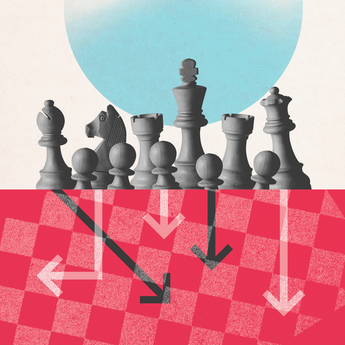MIT graduates have launched thousands of successful companies and created millions of jobs, often with a focus on solving complex challenges in the health, technology, and sustainability sectors. Immersed in an entrepreneurial ecosystem that MIT has fostered for decades, these founders focus on entrepreneurship that matters.
Here, in their own words, is how MIT Sloan founders are addressing one of the largest global challenges: waste.
Spoiler Alert
The entrepreneurs: Emily Malina, with co-founder Ricky Ashenfelter, both MBA ’15
The idea: The consumer packaged goods industry, which includes food, personal care, home care, and other categories, often grapples with what to do with excess, at-risk, and aging inventory. This is a costly financial and environmental challenge for brands, leading to waste, financial losses, and inefficiencies.
Emily Malina, MBA ’15
At the same time, retailers and wholesalers struggle to source high-quality, discounted products to meet consumer demand for affordability, variety, and the treasure-hunt experience that shoppers value.
Spoiler Alert operates at the intersection of waste prevention and business-to-business commerce, focusing on excess products that would otherwise lead to costly write-offs or the landfill. Our platform connects brands with a network of retailers and wholesalers looking for discounted inventory, ensuring products reach consumers instead of becoming waste.
We transform excess inventory from a burden into a profit-driving, sustainable opportunity.
The impact: For brands, Spoiler Alert reduces write-offs and streamlines inventory liquidation, leading to improved profitability. For retailers and wholesalers, we enhance sourcing efficiency, providing access to discounted, high-quality products that drive sales and improve margins. For consumers, Spoiler Alert increases the availability of affordable, brand-name products. And Spoiler Alert prevents waste by keeping surplus inventory in circulation, reducing landfill contributions.
MacroCycle
The entrepreneurs: Stwart Peña Feliz, MBA ’23, with co-founder Jan-Georg Rosenboom
The idea: Today, 85% of globally produced plastic ends up in landfills, in oceans, or in incinerators, resulting in 6% of all global carbon dioxide emissions.
Stwart Peña Feliz, MBA ’23
The recycling industry faces multiple problems: lack of collection, lack of incentives to collect, lack of sorting technologies, lack of proper recycling technologies, and customers unable to pay a premium to support this infrastructure. These challenges compound to the point where it continues to be cheaper to use fossil-fuel-derived plastic.
That’s where MacroCycle comes in: We're commercializing a technology that takes plastic and polyester waste to produce virgin-grade MacroCycle PET or polyester resins. Our proprietary process enables us to recycle PET or polyester from plastic and polyester waste with 80% less energy than traditional processes.
We’re able to do this without added cost, allowing customers to adopt our technology without any barriers. In turn, this allows us to source more supply, preventing and diverting more plastic waste from the landfill or the ocean.
The impact: Before coming to MIT, I worked at one of the first chemical recyclers in the oil and gas industry. I witnessed the not-so-positive impact of those technologies. Plastics were being eliminated from landfills and oceans, but they were being turned into oil for other applications with additional emissions.
MacroCycle provides a pathway where plastics can not only be diverted from landfills and the ocean, but they can also be turned back into plastics without the emissions.
The Sanergy Collaborative
The entrepreneurs: David Auerbach, with co-founders Lindsay Stradley and Ani Vallabhaneni, all MBA ’11
The idea: We provide safe, quality sanitation for residents in fast-growing African cities. We also provide climate-smart agricultural inputs like organic fertilizers for farmers.
David Auerbach, MBA ’11
Our company is made up of three interconnected businesses. Our sanitation company, Fresh Life, serves about 300,000 people across four cities with safe sanitation every day.
Another company, Regen Organics, collects organic waste streams from markets, hotels, and agribusiness. We convert that into agricultural inputs, like organic fertilizer, insect protein, and biochar. We sell those products to about 10,000 farmers who are seeing an incredible increase in yields and incomes. With our products, such as biochar, carbon is both avoided and removed from the atmosphere.
We also offer carbon advisory services through Circular Impact. We work with companies on carbon climate finance to help them get carbon credits.
The impact: On our sanitation side, we serve 300,000 people. This has had an important impact in terms of people living in cleaner, healthier communities. Our toilets are in schools, which has led to increased attendance.
On the agriculture side, we show increases in crop yields of 20% to 70%, which has led to a 40% average income increase. These profits have predominantly been invested in kids’ education.

Strategy for Startups: From Idea to Impact
Register Now




